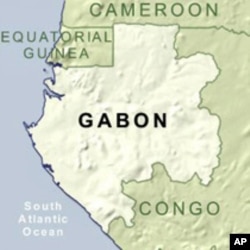Officials from Gabon and Cameroon have agreed to retrace their nearly 300-kilometer border and to stop frequent clashes between border communities. At a meeting in Cameroon's capital Thursday night, the two sides also agreed to jointly deploy their militaries to stop arms trafficking across the border.
Officials from Cameroon and its southern neighbor Gabon ended a three-day meeting Thursday agreeing to better demarcate their border and improve border security.
The meeting, which included delegates from France, Germany, the UN, and other global groups, advised a three-year plan to define the border.
Aime Roger Mouloungui Maganga is secretary general of Gabon's National Border Commission.
He says people along the border between Cameroon and Gabon have willfully or unknowingly removed or damaged border markers built by German and French colonial powers in the 19th century. Maganga says erosion and floods have also destroyed some of the markers. He says Gabon and Cameroon must retrace their border in a way that will satisfy both states.
While the two countries have never fought over their border, border security has been an issue.
Border communities have clashed over natural resources including minerals and sand, water, wood, and wildlife.
Cameroon says in March, villagers on its side blocked a bridge to Gabon in protest of Gabonese troops demanding customs duties, a charge Gabon denies.
Cameroon’s Territorial Administration minister Paul Atanga Nji says militaries from the two countries agreed to carry out joint border controls to stop arms trafficking.
Nji, who headed Cameroon's delegation at the meeting, said Cameroon’s military has seized weapons along the border.
"We have terrorism, arms trafficking, illegal exploitation of our resources, and that is why it is important to increase surveillance and intelligence because we need information," said Nji. "So, when we identify challenges and the security forces{military} are put in place, we can anticipate any danger."
Majority French-speaking Cameroon has been fighting English-speaking separatists in its western regions since 2017.
Cameroon’s government last year said some fleeing separatist fighters disguised as displaced persons were arrested on its southern borders with Equatorial Guinea and Gabon.
Gabon in 2019 closed crossings to Cameroon after an attempted coup against President Ali Bongo, claiming coup leaders were hiding across the border.
At this week’s meeting, both sides agreed to use the border map drawn by former colonial powers as a guiding document.
The Gabonese delegation was led by Gabon’s senior minister of Interior, Lambert Noël Matha.
He says the German Agency for International Cooperation (GIZ), has agreed to provide funding, technical assistance and equipment needed by Cameroon and Gabon for the demarcation of the border. Matha says experts who attended the meeting have agreed on a road map and that joint delegations from Cameroon and Gabon will soon visit hard to access areas of the border.
The boundary was established by German and French colonial powers in the late 19th century and finalized in 1908.
It has not changed after both states gained their independence in 1960.





